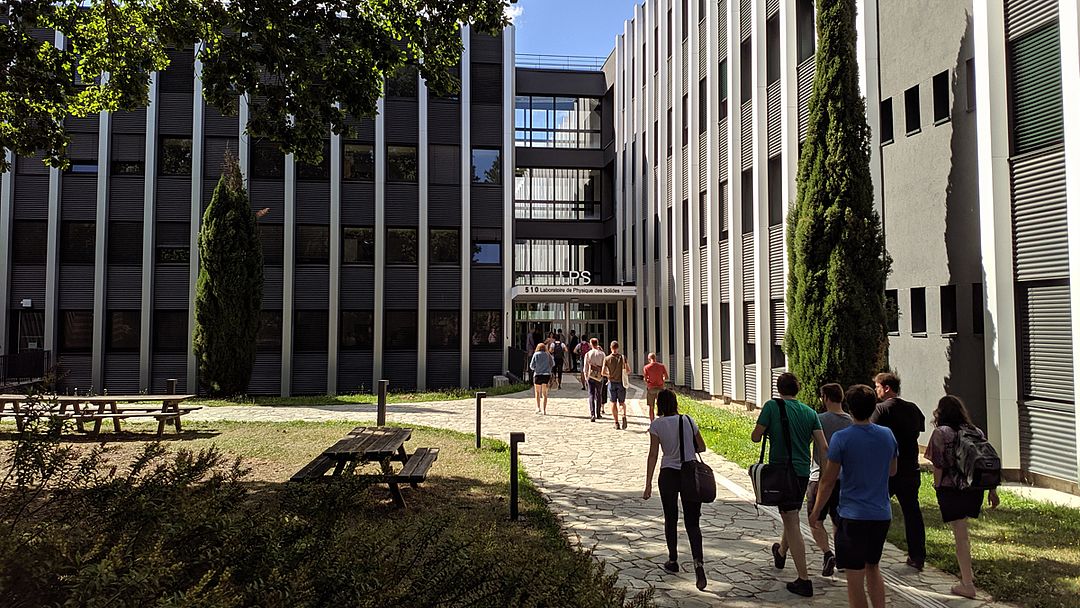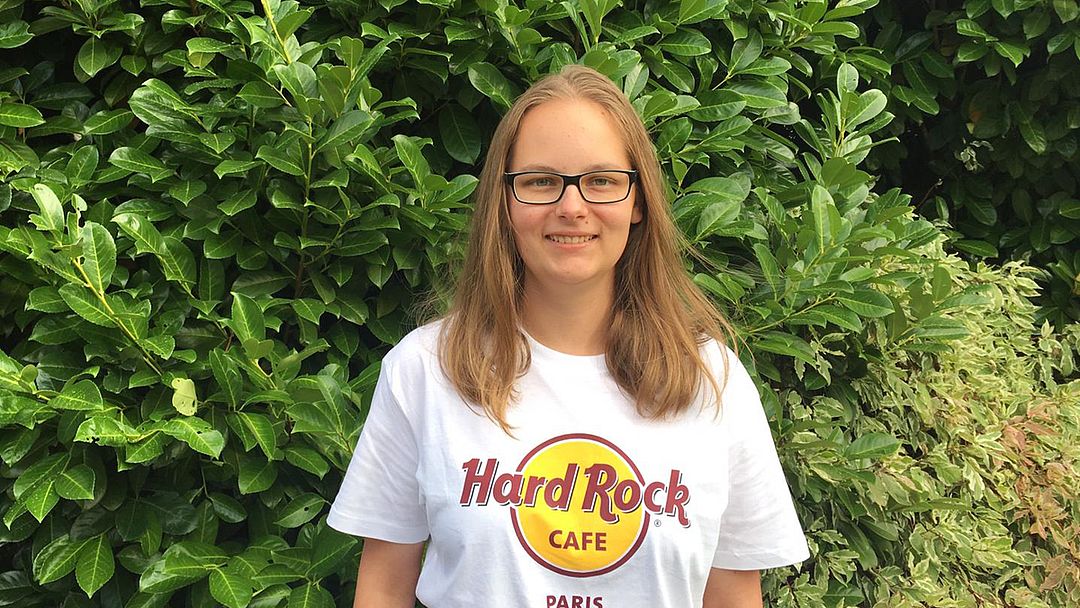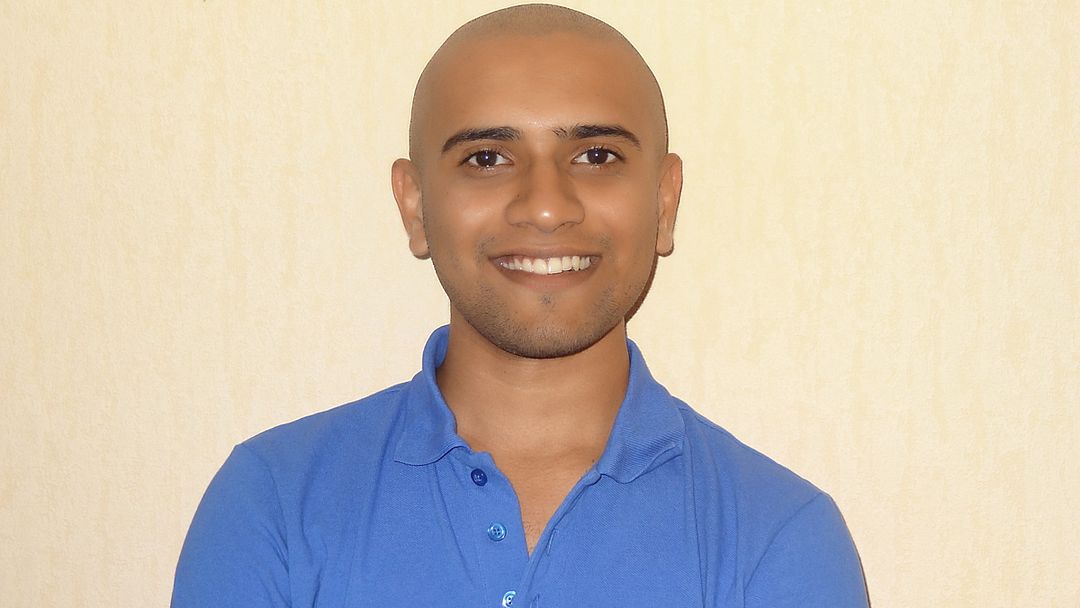Bei der Quantum Future Academy 2019 habt Ihr einen Überblick über aktuelle Forschung und Entwicklung im Bereich der Quantentechnologien erhalten. Was war für Euch persönlich am spannendsten?
Julia: Für mich war es interessant zu sehen, wie ein so abstraktes und theoretisch geprägtes Feld wie die Quantenphysik zur Anwendung gebracht und in zukünftige Produkte umgesetzt werden kann. Besonders spannend fand ich dabei zum Beispiel die unterschiedlichen Ansätze zur Realisierung der Quantenbits. Zu meinen persönlichen Highlights gehört außerdem der Vortrag von Alain Aspect über die zweite Quantenrevolution.
Chintan: Quantum Future Academy 2019 covered an impressive array of diverse topics of Quantum Science. The topics ranged from visits to lab experiments operating at near absolute zero-degree temperatures to lectures on room temperature applications. From all the different topics, I found the ‘Startup’ talks most exciting! It was fascinating to hear how researchers found the courage to venture into the world of business and technology, thereby enabling the ‘technology transfer’ of the Quantum research. The spirit of the startup founders resonated with my goal of making ‘Quantum’ more accessible to the general public through its potential applications in everyday life.
Wie hat Euch die Abschlussveranstaltung am letzten Tag in Paris-Saclay gefallen, vor allem die Paneldiskussion zwischen den Vertretern des deutschen und französischen Ministeriums, der Europäischen Kommission und der Wissenschaft?
Julia: Die Paneldiskussion war eine tolle Gelegenheit, mehr über die politische Seite der Quantentechnologien zu erfahren. Auch wenn sich alle Seiten darüber einig sind, dass Quantentechnologien gefördert werden müssen, war es spannend zu sehen, welche unterschiedlichen Schwerpunkte dabei gesetzt werden.
Chintan: I found the panel discussion between the representatives of the French and German research ministries and the European Commission to be quite informative. The participants were informed about various funding opportunities that are made available to researchers at different stages of their career and even in the ‘startup’ phase. From the discussion, it was apparent that scientific collaboration between different European labs is crucial for Europe to lead the research and application of Quantum Physics.
I personally felt very lucky to have Prof. Alain Aspect end the Quantum Future Academy by giving a scientific presentation on the history and the future of Quantum science. His talk was definitely the cherry on the cake!
Wie intensiv habt Ihr Euch vor der Academy schon mit Quantenphysik auseinandergesetzt?
Julia: Vor der Akademie hatte ich eher grundlegende Kenntnisse der Quantenphysik. Ich hatte einführende theoretische und experimentelle Vorlesungen besucht. Diese fand ich so faszinierend, dass ich meine Kenntnisse im Rahmen der Akademie vertiefen und mehr über deren Anwendungen erfahren wollte.
Chintan: I was introduced to Quantum physics in my Bachelor’s degree in Physics. With this introduction, I came to know about the strange features of nature at small scales and its consequences like entanglement, superposition, wave-particle duality, etc. I got experimental ‘feel’ by doing the famous double-slit experiment. In my Master’s degree in Nanophysics, I explored the field more closely using mathematical notations that describe Quantum states of very small systems.
Könntet Ihr Euch vorstellen, Euch beruflich mit Quantentechnologien zu beschäftigen? Was würde Euch thematisch am meisten interessieren?
Julia: Ich hätte durchaus Spaß daran, mich auch beruflich mit Quantentechnologien zu beschäftigen. Besonders interessant wäre für mich der Bereich der Quantensensorik mit medizinischer Anwendung, da es die Quantentechnologien mit meinem Studium der Medizinphysik verbindet. Dabei könnte ich mir sowohl vorstellen, an einer Universität zu forschen als auch die Umsetzung von Quantentechnologien in einem Unternehmen zu begleiten.
Chintan: Quantum Future Academy has definitely motivated me to pursue a PhD in the field. I personally find Quantum Cryptography to be one of the most promising applications possible in the near future. Quantum Cryptography would provide most secure communication possible that is guaranteed by the laws of nature! This would fundamentally change the way we share our data and communicate. Many such quantum technologies lie at the intersection of basic sciences and industry applications. Progress in such fields would benefit them both. I therefore would not mind working in either the industry or in science if they work towards a common interest.
Wie hat es Euch gefallen, Wissenschaftler und Unternehmen aus dem Bereich der Quantentechnologien aus Frankreich und Deutschland kennenzulernen? Welche Gemeinsamkeiten und Unterschiede sind Euch aufgefallen?
Julia: Es war spannend zu sehen, wie die Leute in den beiden Ländern arbeiten und welche Ansätze sie verfolgen. Auffallend war dabei, dass der Bereich der Quantentechnologien schon jetzt international aufgestellt ist und sich die Arbeitsweisen sehr ähneln.
Chintan: From visiting research labs in four different cities, I realized that each of the labs focused on a specific “Quantum” topic of research. From the interactions with leading researchers of German and French institutions, I got a global overview of the recent advances in their respective fields. Through the Academy, I also had the opportunity to talk to the company executives and got to know more about the expectations that the companies have from young researchers in the field of ‘Quantum’.
Outside of the lecture rooms and labs, the Academy organized wonderful city excursions for all the participants. This gave me a chance to see the city life in different German and French cities. The whole experience definitely makes me want to pursue my PhD in one of the German labs that I visited. I am sure that some of the German students feel the same about the French labs that they got to visit!
Talking about cultural exposure, we watched the Schlosslichtspiele (light show projected on a castle) in Karlsruhe while in Strasbourg we enjoyed the Great summer light show (projected on Cathedral of Notre Dame). Talk about similarities!
Was nehmt Ihr aus der Academy mit in Euren Studien- und Berufsalltag?
Julia: Die Akademie war eine großartige Gelegenheit, um Kontakte zu knüpfen. Sowohl mit den Leuten aus Politik, Wirtschaft und Forschung, als auch mit den restlichen Teilnehmern. Ich hoffe, dass diese Kontakte auch lange nach der Akademie erhalten bleiben.
Chintan: Apart from being exposed to cutting-edge science and technology, I was spent the whole week with 29 other students and got to know about their interests, passions and future ambitions. While some wanted to pursue quantum theory or quantum optics, others wanted to help build algorithms for financial portfolio optimization. Similarly, with the company/startup meetings, I saw a wide-ranging possibility of quantum science application in our everyday life.
Spending a week in such an environment definitely helped me to get out of my ‘comfort zone’. I was able to shape my future goals in order to adapt to the needs of the society and the ‘realistic’ potential applications that quantum science has to offer. The take-away for me was therefore to realize the value of networking with professionals outside your own field of expertise and apply the learnings in your own desired field.
Weitere Informationen
Informationen zur Quantum Future Academy 2019
Fotos der Quantum Future Acacemy 2019


